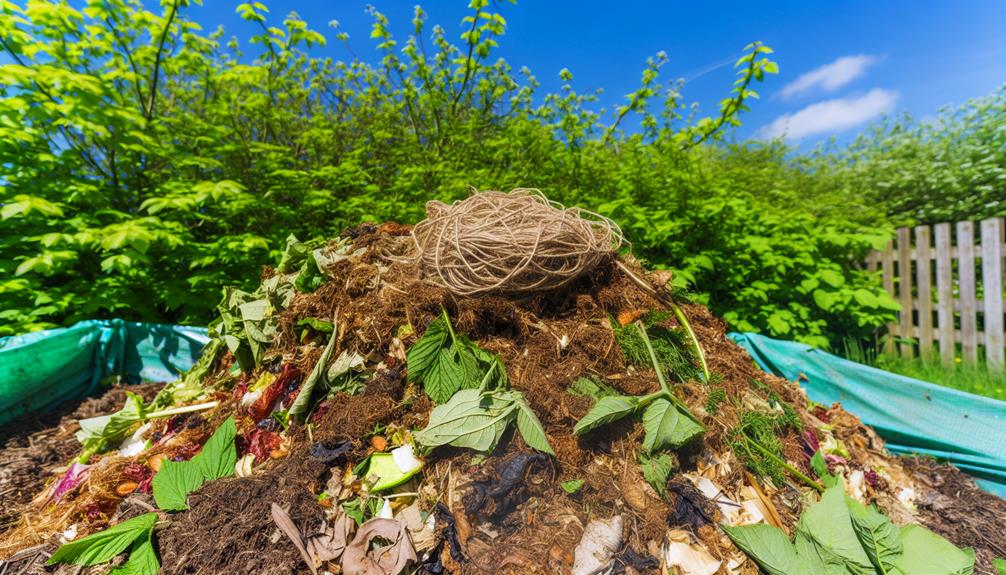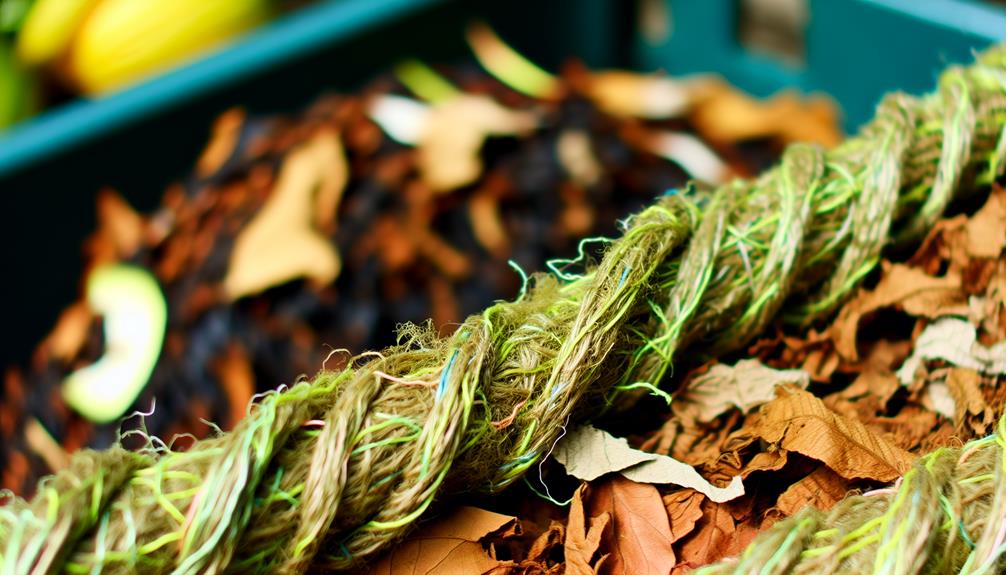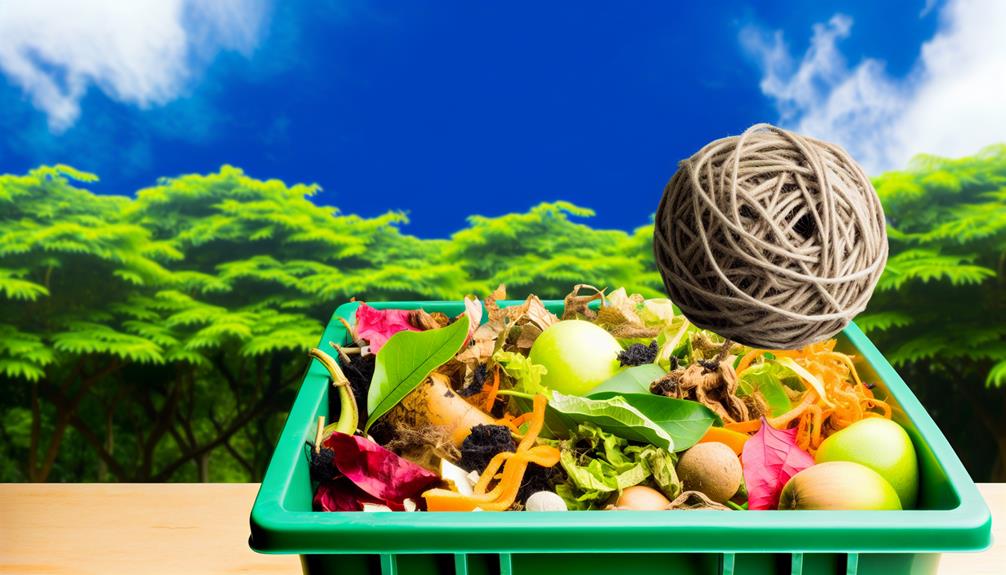

Yes, you can compost twine, but make sure it’s made from natural fibers like jute, hemp, or sisal. These materials are biodegradable and will break down effectively in a compost pile. Avoid synthetic twine made from nylon or polypropylene, as it doesn’t decompose and can harm your compost.
Before composting, cut natural twine into smaller pieces to speed up the decomposition process. Regularly turning your compost pile also helps in breaking down the twine more efficiently. Choosing natural fiber twine benefits both your garden and the environment. For more tips, keep following these guidelines.
There are several types of twine you’ll encounter when starting your composting journey. Understanding the different types of twine is important since not all twine is created equal, and their roles vary based on their durability and usage.
First, let’s talk about synthetic twine. Made from materials like nylon or polypropylene, synthetic twine is known for its impressive durability. It’s strong, resistant to rot, and can handle heavy-duty tasks. However, it’s not ideal for composting because it won’t break down naturally, causing potential harm to your compost pile. You might use synthetic twine for tasks that don’t involve composting, like securing heavy loads or bundling items for storage.
Next, there’s jute twine, a popular choice among gardeners. While it offers good durability for light gardening tasks, its natural fibers make it perfect for composting. Jute twine breaks down relatively quickly, returning nutrients to the soil.
Lastly, let’s not forget sisal twine. Made from the agave plant, sisal twine is durable and biodegradable. It’s suitable for both tying plants and composting, making it a versatile option for many gardening needs.
Choosing the right twine involves balancing its durability and usage to fit your specific composting activities.
Also Read: Can You Compost Bones?
When considering compost-friendly options, natural fiber twine emerges as a top choice due to its biodegradable properties. Made from materials like jute, hemp, cotton, and sisal, this twine breaks down naturally in the compost pile, enriching your garden soil without leaving any harmful residues.
Using biodegradable materials like natural fiber twine in your garden offers several benefits:
| Twine Type | Biodegradability | Common Garden Uses |
|---|---|---|
| Jute | High | Tying plants, securing trellises |
| Hemp | High | Supporting heavy plants, crafting fences |
| Cotton | Medium | Binding delicate plants, garden crafts |
| Sisal | High | Heavy-duty tying, general garden use |
Incorporating natural fiber twine into your gardening routine can foster a sense of belonging to a community that values sustainability and eco-friendly practices. You’ll find that jute is excellent for tying plants and securing trellises, while hemp supports heavy plants and crafts fences with ease. Cotton twine, though slightly less biodegradable, is gentle for binding delicate plants and garden crafts. Sisal is ideal for heavy-duty tying and general garden use.
Also Read: Can You Compost Body Wash?
Often overlooked, synthetic fiber twine offers durability and strength that natural options sometimes can’t match. When you need a reliable, long-lasting solution, synthetic twine might be your go-to.

Made from materials like nylon, polyester, and polypropylene, it’s designed to withstand harsh conditions without breaking down easily.
However, this twine durability comes with a downside: twine disposal. Unlike natural fiber twine, synthetic options don’t decompose readily in a compost pile. They can take years, even decades, to break down, complicating your composting efforts.
So, how should you handle synthetic fiber twine?
First, consider reusing it. Synthetic twine’s longevity means it can be repurposed multiple times before it needs disposal. Use it for tying plants, securing items, or any other task requiring strong, durable twine.
If it’s worn out beyond reuse, check your local recycling guidelines. Some recycling programs accept synthetic fibers, but it’s essential to verify.
Understanding the composting process starts with knowing what materials can break down effectively in your compost pile. By carefully selecting what you add, you can maximize the composting benefits for your garden. Organic materials like vegetable scraps, coffee grounds, and yard clippings decompose quickly and enrich your compost with essential nutrients.
When it comes to twine, it’s important to take into account its decomposition rate. Natural fiber twines, such as those made from cotton, jute, or hemp, break down more easily than synthetic fiber twines. Adding natural twine to your compost pile can help maintain a healthy balance of carbon and nitrogen, which are essential for effective decomposition.
To ensure ideal composting conditions, chop or shred the twine into smaller pieces. This increases the surface area, speeding up the decomposition rate. Regularly turning your compost pile will also help aerate it, promoting faster breakdown of materials.
Also Read: Can You Compost Blood?
The environmental impact of composting twine hinges on the type of materials used, with natural fibers offering a more eco-friendly alternative to synthetic options. When you opt for natural fiber twine, like cotton, jute, or hemp, you’re reducing your carbon footprint to a great extent. These materials decompose more efficiently and contribute to waste reduction, unlike synthetic twine, which can take years to break down and often leaves microplastics behind.

Here’s a quick comparison to help you understand the environmental impact better:
| Material Type | Environmental Impact |
|---|---|
| Natural Fibers | Low carbon footprint, efficient decomposition, no microplastics |
| Synthetic Fibers | High carbon footprint, slow decomposition, microplastic pollution |
By choosing natural fiber twine, you’re not just making a sustainable choice but also joining a community that values environmental responsibility. Checking the labels on twine products to ensure they’re made from biodegradable materials is crucial. Keep in mind that while natural fibers are more compost-friendly, they should still be cut into smaller pieces to accelerate the composting process.
Ultimately, making informed decisions about the type of twine you use can greatly impact waste reduction and help you contribute positively to the environment.
You might wonder if dyed twine can be composted safely. If the twine is made of natural fibers, it’s generally safe. However, consider dye toxicity; some dyes can harm your compost, so choose eco-friendly options.
You’ll find twine composts faster in commercial facilities due to their ideal conditions. These facilities enhance biodegradation rates, making them more efficient. Joining a community composting program gives you access to these advanced processes.
To test if twine is compostable at home, start by checking its material composition. Bury a small piece in your compost pile and monitor its biodegradation timeline. You’ll feel connected to nature and fellow eco-enthusiasts!
Yes, twine can attract pests to the compost pile. Implementing pest deterrents like covering the pile or using natural pest repellents will aid in effective pest management, helping you maintain a healthy and welcoming composting community.
You can explore alternatives like using biodegradable materials for tying things. They offer eco-friendly disposal options that align with your green values, helping you feel part of a community committed to sustainability and the environment.
When composting, prioritize using natural fiber twine like jute or hemp, which decompose efficiently. Avoid synthetic fiber twine, as it doesn’t break down and can harm your compost.
Check the twine for any chemical treatments before adding it to your pile. By making mindful choices, you’ll help create nutrient-rich compost and reduce environmental waste.
Remember, a successful compost pile relies on organic, untreated materials for the best results. Happy composting!
